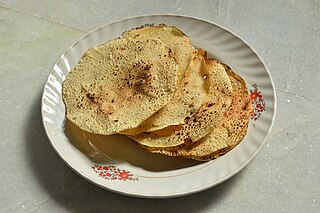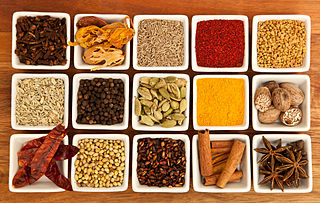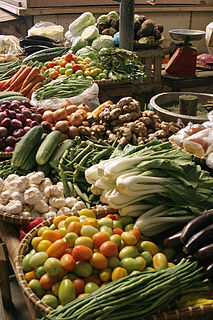Vegetable farming is the growing of vegetables for human consumption. The practice probably started in several parts of the world over ten thousand years ago, with families growing vegetables for their own consumption or to trade locally. At first manual labour was used but in time livestock were domesticated and the ground could be turned by the plough. More recently, mechanisation has revolutionised vegetable farming with nearly all processes being able to be performed by machine. Specialist producers grow the particular crops that do well in their locality. New methods—such as aquaponics, raised beds and cultivation under glass—are used. Marketing can be done locally in farmer's markets, traditional markets or pick-your-own operations, or farmers can contract their whole crops to wholesalers, canners or retailers.

In cuisine, an omelette or omelet is a dish made from beaten eggs, fried with butter or oil in a frying pan. It is quite common for the omelette to be folded around fillings such as chives, vegetables, mushrooms, meat, cheese, or some combination of the above. Whole eggs or egg whites are often beaten with a small amount of milk, cream, or water.

Polish cuisine is a style of cooking and food preparation originating in or widely popular in Poland. Polish cuisine has evolved over the centuries to become very eclectic due to Poland's history and it shares many similarities with neighbouring German as well as Ashkenazi Jewish culinary traditions and vice-versa. Polish-styled cooking in other cultures is often referred to as à la polonaise.

A samosa is a fried or baked pastry with a savory filling, including ingredients such as spiced potatoes, onions, peas, chicken and/or other meats. It may take different forms, including triangular, cone, or half-moon shapes, depending on the region. Samosas are often accompanied by chutney, and have origins in medieval times or earlier. Samosas are a popular entrée, appetizer, or snack in the local cuisines of South Asia, the Middle East, Central Asia, East Africa, and other regions. Due to emigration and cultural diffusion from these areas, samosas today are often prepared in other parts of the world.

Irish stew is a lamb or mutton and root vegetable stew native to Ireland. As in all traditional folk dishes, the exact recipe is not consistent from time to time, or place to place. Basic ingredients include lamb, or mutton, as well as potatoes, onions, and parsley. It may sometimes also include carrots. Irish stew is also made with kid.
Irish stew is a celebrated Irish dish, yet its composition is a matter of dispute. Purists maintain that the only acceptable and traditional ingredients are neck mutton chops or kid, potatoes, onions, and water. Others would add such items as carrots, turnips and pearl barley; but the purists maintain that they spoil the true flavour of the dish. The ingredients are boiled and simmered slowly for up to two hours. Mutton was the dominant ingredient because the economic importance of sheep lay in their wool and milk produce and this ensured that only old or economically non-viable animals ended up in the cooking pot, where they needed hours of slow cooking. Irish stew is the product of a culinary tradition that relied almost exclusively on cooking over an open fire. It seems that Irish stew was recognised as early as about 1800.

Sweet and sour is a generic term that originated from Chinese cuisine and encompasses many styles of sauce, cuisine and cooking methods. The etymology of the term "Sweet and Sour" comes from the Chinese word "甜酸"(甜 = sweet, 酸 = sour), formally used in Chinese dishes as "糖醋“. It is commonly used in China since the Tang Dynasty (618-907), East Asia, Southeast Asia, and has been used in England since the Middle Ages. Sweet and sour remains popular in Europe and the Americas.

A fritter is a portion of meat, seafood, fruit, vegetables or other ingredients which have been battered or breaded, or just a portion of dough without further ingredients, that is deep-fried. Fritters are prepared in both sweet and savory varieties.

Dayuan District, formerly known as Dayuan Township is a rural, coastal district in northwestern Taoyuan City, Taiwan.
OTC Markets Group is an American financial market providing price and liquidity information for almost 10,000 over-the-counter (OTC) securities. The group has its headquarters in New York City. OTC-traded securities are organized into three markets to inform investors of opportunities and risks: OTCQX, OTCQB and Pink.
Peruvian cuisine reflects local practices and ingredients including influences mainly from the indigenous population, including the Inca, and cuisines brought by immigrants from Europe ; Asia ; and Africa. Without the familiar ingredients from their home countries, immigrants modified their traditional cuisines by using ingredients available in Peru.

A Papadam or Appalam is an Indian deep fried dough of black gram bean flour, either fried or cooked with dry heat until crunchy. Other flours made from lentils, chickpeas, rice, tapioca, millet or potato are also used. Papad is typically served as an accompaniment to a meal in India, Pakistan, Bangladesh, Nepal and Sri Lanka or as an appetiser, often with a dip such as chutneys or toppings such as chopped onions and chillies, or they may be used as an ingredient in sabjis.

Kettle Foods, Inc. is an American manufacturer of potato chips, based in Salem, Oregon, United States, with a European and Middle East headquarters in Norwich, United Kingdom. As of 2006 they were the largest natural potato chip brand in the U.S.

Gujarati cuisine is that of the state of Gujarat, in western India.

A curry puff is a snack of Maritime Southeast Asian origin. It is a small pie consisting of curry with chicken and potatoes in a deep-fried or baked pastry shell. The curry is quite thick to prevent it from oozing out of the snack.

Ghanaian cuisine is the cuisine of the Ghanaian people. Ghanaian main dishes are organized around a starchy staple food, which goes with a sauce or soup containing a protein source. The main ingredients for the vast majority of soups and stews are tomatoes, hot peppers and onions. As a result, most of the Ghanaian soups and stews are red or orange in appearance.

Vegetables are parts of plants that are consumed by humans or other animals as food. The original meaning is still commonly used and is applied to plants collectively to refer to all edible plant matter, including the flowers, fruits, stems, leaves, roots, and seeds. An alternate definition of the term is applied somewhat arbitrarily, often by culinary and cultural tradition. It may exclude foods derived from some plants that are fruits, flowers, nuts, and cereal grains, but include savoury fruits such as tomatoes and courgettes, flowers such as broccoli, and seeds such as pulses.
Enza Zaden is a vegetable breeding company from Enkhuizen in North Holland, which produces vegetable seeds for the professional market. The company belongs to the ten biggest vegetable breeding companies in the world and has over thirty subsidiaries and over 2,000 employees. Beside the main crops: tomato, pepper, cucumber and lettuce, Enza Zaden also breeds melon, onion, and many other vegetables. "Enza" is an abbreviation from the old name "Enkhuizer Zaadwinkel"
The horticulture industry embraces the production, processing and shipping of and the market for fruits and vegetables. As such it is a sector of agribusiness and industrialized agriculture. Industrialized horticulture sometimes also includes the floriculture industry and production and trade of ornamental plants.













